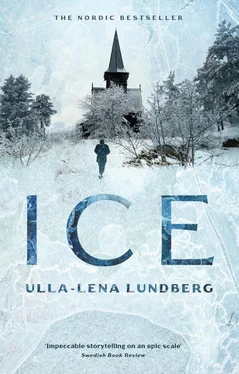A straight line from the sacristy to the pulpit. No sidelong glance at Mona’s anxious, encouraging face, straight up the little staircase. Bows his head in prayer, which is nothing but black terror. Help me! While the congregation sings a convincing “Should earth and heaven cease to be, Yet shall I find my joy in Thee.” Simultaneously a creaking from the number board, which the verger sets swinging to signal them to stop.
The church grows quiet, and the priest stands alone in the pulpit, no longer protected by his prayer book. He raises his head from his simulated prayer and looks out over the congregation. Nothing but friendly, solemn, interested faces. Now he knows what to say.
“Dear friends, brothers and sisters in Jesus Christ. We are gathered for worship in our own church. For me, it is the first time, and I will never forget my first meeting with this church on the bay. As you know, the journey out here is a long one, and during the night a person can almost lose his courage and regret coming. But the journey’s end comes into view with the morning light. All of you know the joy you feel when you see the church and the bell tower begin to take shape in the distance, and you know you are almost here. It was so beautiful, I was so delighted, and so happy. And I thought, in the words of the Bible, This is none other but the house of God, and this is the gate of heaven.”
The church is silent, but he hears a slight, friendly murmur, as if his words were being well received. He goes on, as if speaking in confidence to good friends. “Let us pray. Dear Lord. You look deep into our hearts and see us as we are, imperfect and inconstant. But you also see our hope and our toil. Thank you for your mercy towards us, your compassion and your forgiveness. Thank you for allowing us to turn to you today and all other days. Amen.” And then he reads the text from the Gospel of John, “ask, and ye shall receive, that your joy may be full.” And the wonderful final verse, “In the world ye shall have tribulation: but be of good cheer; I have overcome the world.”
The priest is moved and inspired and he thinks that last year’s sermon on this theme is not so terribly dreadful after all. With certain embellishments and additions it will be like new, which in truth it is for this audience, and, carefully, he moves into his text, which does have its moments. His voice is cheerful, and he allows himself to look out over the congregation and feels he has made contact. They are with him, even the ones who are asleep, old people who have heard all the sermons they need to hear and now take a blessed pause in the heavy air of a full church.
Yes, they’re going to say that he sings better than he speaks, but on the other hand, he sings better than many others! As the sermon of a young priest at the beginning of his career, it isn’t half bad, and, exhilarated, he rounds it off and turns to the announcements: a thanksgiving for the life of an old man who has died and a reminder of next week’s service.
Finally the collection, which this day will go to the Evangelical Society. Lord bless our offering. The organist’s baritone takes up “Jesus, lead my steps, I pray” and the parishioners shift in their pews, dig into pockets and purses, snap open or shut their pocketbooks, and begin to sing “To follow in Thy blessed way”. The verger emerges from the sacristy and begins making his rounds with his collection bag. The priest comes down from the pulpit and pulls off his own cassock and puts on his robes and surplice for Communion and the closing liturgy.
They sing and sing, and the verger moves solemnly from pew to pew. The collection bag is passed along to those sitting closer to the wall, and it all takes time. They sing slowly, and the hymn is long enough. During the eighth verse, the verger comes in and checks to see that the priest is presentable. Prayer book and Bible in hand, he goes out into the church, which has gone so quiet that he can hear Sanna whining and whimpering. He knows Mona is holding her arm hard and hissing at her to be quiet. It’s been a long service for such a small person, and there’s a lot more to come—some lovely antiphonal song, the Invocation to Holy Communion, the Our Father, a trembling “O Lamb of God”. The invitation, “Draw near with faith.”
But no one comes. They look sullen, stare at the floor or glance at one another, need to be urged as if they were at a party. Wasn’t it the organist who tried to hint that they didn’t like Communion? If only the Sunday service could consist entirely of singing! Then they’d be the most Christian people in the world, but now it’s apparent that they shrink from an individual commitment, from surrender, from the requirement to seem pious.
What if no one comes? The organist has to play, and the verger has his duties. Mona is sitting with Sanna, they agreed on that. It’s unpleasantly quiet. No one looks up, but then he hears someone stand up in the middle of a row. It’s Adele Bergman. She looks negative and distant, but someone has to. She crowds her way past those sitting closer to the aisle, who shift out of her way reluctantly, certainly not about to follow her example. Adele’s gentle husband follows her, and then things start to loosen up in the rest of the church, the vestry and the parish council perhaps. But all of them hesitant and shame-faced, unwilling to meet anyone’s gaze.
They curtsey and bow before the altar, and genuflect. So few come, and there is no second setting of the table. The priest himself is trying to get used to Communion, which he would like to see as a symbolic act. The problem is that wherever he goes there is someone who will argue with him and insist that he, as a priest of the church, must believe that the wine is actually transformed into the blood of Christ. When he explains that we drink from the chalice in memory of the blood shed for us, the person in question grows indignant and accuses the
priest of lack of faith and heresy. He still likes best the Sundays that have a service without Communion. Here on the Örlands, that means three Sundays of four, and that suits him fine.
The organist plays beautifully and the priest passes out Communion wafers and follows up with the chalice, drying the cup with a linen cloth after every sip. “Shed for thee.” And then, bowing and curtseying, relieved, a little happier because it’s over, they walk back to their pews. The priest takes Communion himself, and when he drinks he notes how thirsty he is, and he still has the closing liturgy ahead of him.
The organist plays, and the priest sings the Anthem of Praise with the congregation and reads the blessing. And now the congregation kicks into life, forgets its ill humour and sings the closing hymn, “Like Shining Sunrise in the Spring”, with such a will that he realizes that in future he needs to pick longer hymns. When the three verses have been sung, they would like to go on, but the verger has scurried away on tiptoe to ring the bells, and the organist sets to work on his postlude, which the priest recognizes as Cappelen’s “Prayer” (adagio). The organ has a lovely, bright sound, which breaks down once or twice when the pumper pauses at his work.
It is over, and he is back in the sacristy. Off with his gown, the alb over his head, and back into his cassock. People are on their way out of the church, coughing and talking quietly as their feet move towards the door, leaving behind them a cloud of cough drops and naphthalene. The bells are still ringing, but soon they stop and the verger returns, along with the organist, who comes nimbly down the steps from the organ loft, warding off with his hand a corner of the upper floor that seems designed to knock an intruder senseless. They all look pleased, and the priest thanks them warmly. “And how they sing!” he adds. “I’m going to be really happy here.”
Читать дальше












